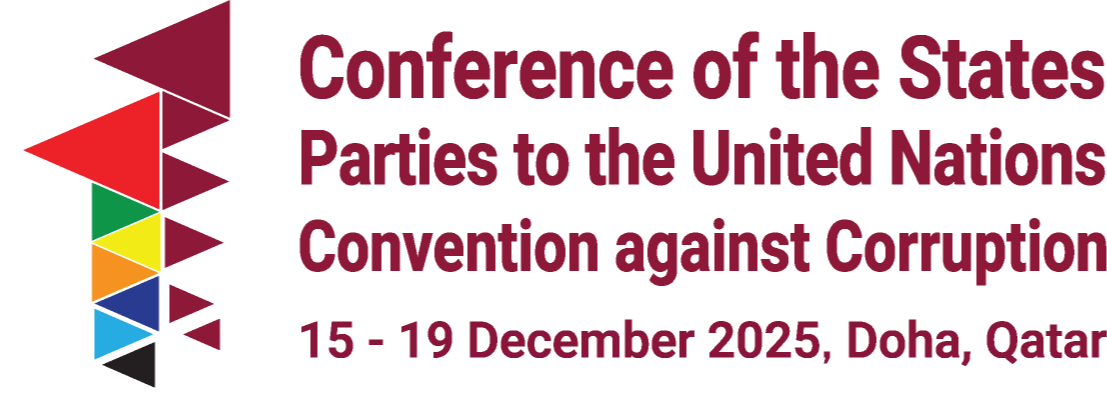The UNCAC Coalition has released the 2025 Civil Society Toolkit ahead of the 11th Conference of the States Parties (CoSP) to the United Nations Convention Against Corruption (UNCAC), scheduled to take place in Doha, Qatar, from 15–19 December 2025.
This toolkit serves as a practical guide for civil society organizations (CSOs) planning to participate in CoSP11, helping them understand procedures, plan activities, and maximize their impact before, during, and after the conference.
The Conference of the States Parties (CoSP)
The CoSP is the main decision-making body of the UNCAC. All States that have ratified the Convention are automatically part of the Conference, while signatories, non-signatories, intergovernmental organizations, and non-governmental organizations can apply for observer status.
The CoSP convenes every two years to adopt resolutions and decisions that enhance international cooperation, promote the Convention’s implementation, and strengthen States’ capacity to prevent and combat corruption. Subsidiary bodies — such as the Implementation Review Group, the Working Group on Prevention, the Working Group on Asset Recovery, and Expert Meetings on International Cooperation operate under the CoSP’s mandate to advise and support its work.
Why Participate?
Civil society participation in the CoSP is an essential pillar of accountability and inclusion. According to the toolkit, CSOs can:
Demonstrate expertise and contributions to anti-corruption efforts.
Share best practices and lessons learned.
Influence CoSP discussions and resolutions.
Monitor government commitments and positions.
Engage with government officials, other CSOs, and international bodies.
Advocate for civic space and transparency at the UN level.
Only organizations, not individuals, may participate, and ECOSOC-accredited NGOs automatically receive invitations. Other relevant NGOs must apply for participation through the UN Office on Drugs and Crime (UNODC).
Before the Conference
1. Applying to Participate
NGOs with ECOSOC status receive automatic invitations.
Other NGOs must apply to UNODC for participation. If no State Party objects, they will be invited before the conference.
Participants must apply for visas following the host country’s instructions.
2. Reaching Out to Governments
Civil society is encouraged to connect with national delegations to influence the CoSP agenda and upcoming resolutions. This includes:
Discussing national anti-corruption efforts and implementation of UNCAC recommendations.
Reviewing commitments made under the UNGASS Political Declaration.
Encouraging governments to defend civic participation and transparency.
Promoting inclusion of civil society representatives in official delegations.
3. Planning Special Events (Side Events)
Organizing or co-hosting side events allows CSOs to raise awareness on priority anti-corruption topics. Events co-organized with States Parties have higher chances of approval.
4. Making Written Submissions
CSOs can submit written reports on UNCAC implementation:
ECOSOC-accredited NGOs: up to 2,000 words.
Accredited non-ECOSOC NGOs: up to 1,500 words.
Submissions should be sent to uncac@un.org several weeks before the conference.
During the Conference: Modalities of Participation
Accredited CSOs can attend plenary sessions and side events, deliver oral or video statements after States Parties have spoken, and distribute materials to delegates. However, they cannot attend subsidiary body meetings.
Oral statements must meet UN standards and avoid language targeting specific countries, while still addressing systemic issues and advocating strong positions.
CSOs are encouraged to hold meetings with government delegations on the sidelines of the conference and actively engage in discussions on resolutions.
After the Conference
The toolkit emphasizes the importance of follow-up to sustain momentum beyond CoSP11. Civil society organizations should:
Prepare statements for the media and stakeholders on conference outcomes.
Track States’ commitments made during the CoSP.
Review UNODC reports on adopted resolutions and monitor how CSO input was reflected.
Attend post-CoSP briefings and intersessional meetings.
Join the UNCAC Coalition to continue advocacy, share updates, and strengthen collaboration on implementation and monitoring.
Meaningful CoSP Resolutions
The toolkit defines a meaningful CoSP resolution as one that:
Strengthens and raises the bar of existing commitments.
Goes beyond general calls for implementation to specify concrete actions.
Mandates information sharing and research through UNODC.
Sets agendas for subsidiary bodies and technical assistance programs.
Such resolutions are key to ensuring that the UNCAC remains dynamic, inclusive, and effective.
Other Useful Information and Resources
The toolkit provides a list of resources for both governments and civil society to support engagement around CoSP11, including:
UNODC Guidance Notes on NGO participation.
UNCAC Coalition guides for governments and CSOs.
Links to CoSP11 information for participants, review status trackers, and transparency pledges.
Access to the UNCAC Coalition’s newsletter, working groups, and membership network.
Conclusion
The UNCAC Coalition Civil Society Toolkit 2025 serves as both a roadmap and a rallying call for meaningful civic participation at CoSP11. It underscores that anti-corruption efforts cannot succeed without the voices of civil society — the watchdogs, advocates, and communities ensuring that transparency, accountability, and justice are more than just words on paper.
Civil society has a critical role in shaping global anti-corruption policy, defending civic space, and holding governments to their commitments. As the world gathers in Doha this December, CSOs are urged to prepare, engage, and continue the fight for integrity and accountability in all nations.
For the full toolkit and related resources, visit www.uncaccoalition.org

